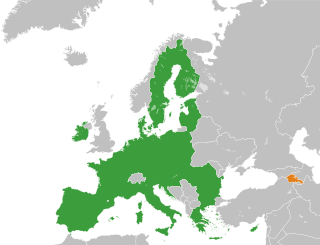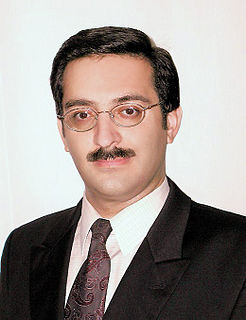
The South Caucasus, also known as Transcaucasia or the Transcaucasus, is a geographical region on the border of Eastern Europe and Western Asia, straddling the southern Caucasus Mountains. The South Caucasus roughly corresponds to modern Armenia, Georgia, and Azerbaijan, which are sometimes collectively known as the Caucasian States. The total area of these countries measures about 186,100 square kilometres. The South Caucasus and the North Caucasus together comprise the larger Caucasus geographical region that divides Eurasia.

The politics of Europe deals with the continually evolving politics within the continent of Europe. It is a topic far more detailed than other continents due to a number of factors including the long history of nation states in the region as well as the modern day trend towards increased political unity amongst the European states.

The main religion in Azerbaijan is Islam, though Azerbaijan is the most secular country in the Muslim world. Estimates include 96.9% and 99.2% of the population identifying as Muslim. Most are adherents of Shia Islam, with a minority (15%) being Sunni, differences traditionally have not been defined sharply. Most Shi'a are adherents of orthodox Ithna Ashari school of Shi'a Islam. Following many decades of Soviet atheist policy, religious affiliation is nominal in Azerbaijan and Muslim identity tends to be based more on culture and ethnicity than religion. Traditionally villages around Baku and Lenkoran region are considered stronghold of Shi'ism. In some northern regions, populated by Dagestani (Lezgian) people, Sunni Islam is dominant.

In the United States Government, the Bureau of European and Eurasian Affairs (EUR) is part of the United States Department of State, charged with implementing U.S. foreign policy and promoting U.S. interests in Europe and Eurasia, as well as advising the Under Secretary of State for Political Affairs. It is headed by the Assistant Secretary of State for European and Eurasian Affairs.
The International Strategic Research Organization is an independent think-tank established in 2004. It pursues interdisciplinary studies on national and international political, economic and security issues.

Matthew James Bryza is a former United States diplomat. His last post in the United States foreign service was the United States Ambassador to Azerbaijan.
Brenda Shaffer is an American scholar who holds positions as Fellow with the Atlantic Council and professor at University of Haifa. Shaffer was the former research director of the Caspian Studies Program at Harvard's Kennedy School of Government and past president of the Foreign Policy Section of the American Political Science Association. She specializes on energy in international relations and energy policy in the Caspian region and has written or edited several books of these topics, including "Energy Politics" and "Beyond the Resource Curse." Shaffer has also written a number of books on the topic of identity and culture in the Caucasus including explorations of Azeri literature and culture. She has been accused of lobbying for Azerbaijan and failing to disclose conflicts of interest.

Armenia and the European Union have maintained positive relations over the years. Both parties are connected through the Comprehensive and Enhanced Partnership Agreement (CEPA), which was signed in 2017. Armenian former Foreign Minister Eduard Nalbandyan expressed confidence that the new partnership agreement would "open a new page" in EU-Armenia relations. While, the former High Representative of the Union for Foreign Affairs and Security Policy, Federica Mogherini concluded in June 2019, that Armenia-EU relations are on an “excellent” level.
Svante E. Cornell is a Swedish scholar specializing on politics and security issues in Eurasia, especially the South Caucasus, Turkey, and Central Asia. He is a director and co-founder of the Stockholm-based Institute for Security and Development Policy (ISDP), and Research Director of the Central Asia-Caucasus Institute & Silk Road Studies Program (CACI), and joined the American Foreign Policy Council as a Senior Fellow for Eurasia in January 2017.

The Republic of Azerbaijan and the European Union (EU) have maintained a positive relationship through the years and have become more closely linked since 1991. Azerbaijan is currently part of the European Neighborhood Policy, the Eastern Partnership and the Council of Europe. The EU is the largest foreign grant donor and investor of Azerbaijan, both in the government sector and civil society making available over 600 million EURO of bilateral EU assistance since 1992.

The following outline is provided as an overview of and topical guide to Armenia:
The Central Asia-Caucasus Institute or CACI was founded in 1996 by S. Frederick Starr, a research professor at Johns Hopkins University's School of Advanced International Studies. He has served as vice president of Tulane University and as president of Oberlin College (1983–1994) and the Aspen Institute. He has advised three U.S. presidents on Russian/Eurasian affairs and chaired an external advisory panel on U.S. government-sponsored research on the region, organized and co-authored the first strategic assessment of Central Asia, the Caucasus and Afghanistan for the Joint Chiefs of Staff in 1999, and was involved in the drafting of recent U.S. legislation affecting the region.

The Center for Strategic Studies under the President of the Republic of Azerbaijan (SAM) is Azerbaijan’s first governmental, non-profit think tank founded on November 12, 2007 by the Decree of the President, Ilham Aliyev. Its headquarters is in Baku, Azerbaijan. In February 2008, by the Decree of the President of the Republic of Azerbaijan, Elkhan Nuriyev was appointed director of the Center for Strategic Studies, known by the acronym SAM in Azerbaijani language.

Sinan Oğan is a Turkish politician of Azeri origin, who won a seat in the Turkish parliament in 2011 with the right-wing Nationalist Movement Party.

The Caucasus Institute is a think tank and postgraduate institution. Its focus is on encouraging pluralistic discourse in the South Caucasus, including the countries of Armenia, Azerbaijan, and Georgia. Its goal is to promote inclusive policy-making in Armenia through conducting research, producing and advocating policy documents and encouraging a pluralistic and informed public policy debate.
The Caucasus Research Resource Centers program (CRRC) is a network of training, research support and resource centers established in 2003 in the capitals of Georgia, Armenia and Azerbaijan. CRRC’s primary aim is to improve and progress research on social sciences and public policy analysis in the South Caucasus region. CRRC is based on a partnership among the Carnegie Corporation of New York, the Eurasia Partnership Foundation, USAID and top local universities. The program establishes a network for scholars, researchers and practitioners to strengthen their research capabilities, integrate various social science research methods and get engaged with their local research community. CRRC’s regional office is devoted to assisting the country-based centers as they work to establish effective partnerships among scholars, policy practitioners, social science research professionals, as well as representatives from governmental and non-governmental sectors. In 2004, CRRC began the largest coordinated data collection effort in the South Caucasus known as the Caucasus Barometer. The Caucasus Barometer is an annually conducted nationwide survey in Georgia, Armenia and Azerbaijan that covers a wide range of social, economic and political issues in the region. With a sample size of about 6,000 people, the Caucasus Barometer is free and available to the public on CRRC’s website as are most of CRRC’s projects. In addition to the Caucasus Barometer, CRRC conducts over 10 national surveys, focus groups and other research projects every year in the South Caucasus.

Elkhan Nuriyev is a political scientist and a recognized expert on Russia, Eastern Europe, Caucasus, Central Asia and the Greater Middle East. He has published widely as a scholar, and he conducts regular briefings at the request of the international organizations and think tanks. He is frequently called on by government agencies, media, academic circles and private-sector institutions for comment and consulting on Russian foreign policy, Caucasus, wider Black Sea-Caspian Basin, Central Asia and regional security issues in post-Soviet Eurasia. In 2014, Nuriyev was a DAAD Senior Fellow at the German Council on Foreign Relations in Berlin. In 2015, he was a Humboldt Senior Fellow at the German Institute for International and Security Affairs in Berlin. In 2017, Elkhan Nuriyev served as Corridors Fellow for Dialogue and Cooperation at the Leibniz Institute for East and Southeast European Studies, Regensburg, Germany. He is a Global Energy Associate at the Brussels Energy Club and is also a Senior Expert on Russia, Eastern Europe and Central Asia at L&M Political Risk and Strategy Advisory in Vienna. In 2019, Nuriyev worked as a Humboldt Senior Fellow at Zentrum für Osteuropa- und internationale Studien (ZOiS) / Centre for East European and International Studies. In 2020, he was an Eastern Europe-Global Area (EEGA) Fellow at the Research Centre Global Dynamics, Leipzig University. In 2021, Elkhan Nuriyev worked as a Think Visegrad Visiting Fellow at the Institute for Foreign Affairs and Trade (IFAT) in Budapest.
Electric Yerevan, also known within Armenia as No to Robbery protests, were mass protests which occurred in the summer of 2015 against a 17% hike in electricity rates within Armenia. The protests were successful in reversing the price hike and causing the sale of Electric Networks of Armenia from Inter RAO to the Tashir Group.
The Institute of Caucasus Studies of ANAS - is a scientific research Institute in the structure of ANAS.
Topchubashov Center is a Baku-based think tank that focuses on international relations and security.












